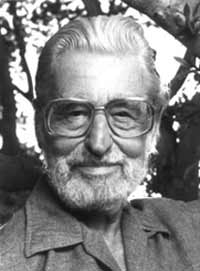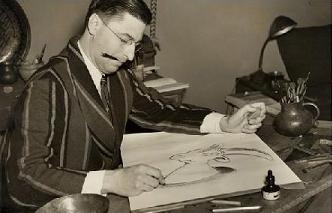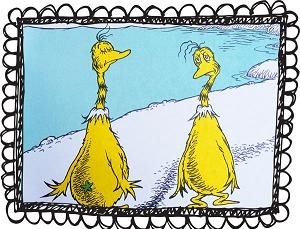 |
| Theodor Geisel (http://www.google.com/imgres?q=Theodor+Geisel&num= ()) |
"Finally I can say that I write not for kids but for people,"(Encyclopedia of World Biography)Theodor Geisel, a famous author commonly known as Dr. Seuss, was proud to say that he wrote books that made people realize the importance of children. Geisel was born on March 2nd, 1904 in Springfield. As a child, Geisel practiced sketching a variety of animals at his local zoo. As an adult, he graduated from Dartmouth College in 1925 and traveled through Paris and to New York. Before becoming a writer, Geisel spent 15 years in the advertisement business and later joined the army. After the army, he made two documentaries, Hitler Lives and Design for Death, which later became Oscar award winning movies. In 1936, his first published book, titled And to Think That I Saw it on Mulberry Street, became popular for its "unique drawings" (Encyclopedia of World Biography). In 1940, his next book, Horton Hatches the Egg, was published and was even more successful than his previous book for its drawings and hilarious rhymes. For the next 30 years, Geisel continued to entertain to world with his comedic rhymes and unique drawings. Unfortunately, on September 24th, 1991, Theodor Geisel passed away due to throat cancer. Throughout his life, Geisel wrote 47 books that were translated into over 20 different languages that sold over 200 million copies in total (Encyclopedia of World Biography). In many of his books, Geisel always included a moral or a lesson he wanted to teach to his readers. He targeted his writing towards younger readers because he believed that they were the ones that could change society. Geisel should be recognized as a hero because he brought happiness to his readers through his books. He used them to educate people about global problems, and influenced his readers to have good morals through writing.
 |
| Creating an Original Drawing (http://now.dartmouth.edu/2012/04/dartmouth-names-m ()) |
Geisel's original and creative books entertained many readers and motivated them to read more. His books have a reputation as funny and entertaining. However: "Before Geisel, juvenile books were largely pastel, predictable, and dominated by a didactic tone"(Encyclopedia of World Biography). Geisel's original characters and creative rhymes renovated children's books to make them exciting and fun to read. Also: "Dr. Seuss brought a whimsical touch and a colorful imagination to the world of children's books"(Encyclopedia of World Biography). Unlike past books, Geisel's books have variety of tones that range from comedic to serious. Because of these tones, his books are never plain and entertain all who read his books. Since his books are always entertaining, Geisel could easily motivate young readers to read. He taught kids that: "... reading was a joy and not a chore...'"(Encyclopedia of World Biography). Geisel used his imagination and comedic rhymes to make children's books an easier read. In doing so, kids enjoyed reading and more learned not to resent reading as much. By using his imagination and comedic writing, Geisel changed how children's books were written making them more enjoyable to kids to read.
 |
| Drawing about Segregation (http://www.google.com/imgres?q=the+sneetches&um=1& ()) |
During the 1900's, the U.S was going through hard times; such as, The Great Depression and segregation. These issues occurred in Geisel's writing because he wanted to educate the public of how some beliefs can be wrong. One book Geisel wrote, titled The Sneetches, demonstrates how he was influenced by the segregation around him. Not only that book, but several of: "his most popular children's books included parables about racism, anti-Semitism, the arms race, and the environment. But, equally important, he used his pen to encourage youngsters to challenge bullies and injustice"(Dreier). Through his writing Geisel, showed that he wanted to have a better society; one without racism or inequality. He believed that educating people about public issues could make a better society. Geisel also observed, during his time, that there were many abusing power. "Many Dr. Seuss books are about the misuse of power -- by despots, kings, and other rulers, including the sometimes arbitrary authority of parents" (Dreier). He strongly believed that a dictatorship and "misuse of power" was wrong. In an attempt to correct these false beliefs, Geisel wrote about them in his books and how they can hurt society. He believed that if he wrote informative and entertaining books about global problems; then, he would be able to change society for a better.
Geisel used his writing in attempt of influence good morals to his readers. Geisel strongly believed that everybody has a voice and that their opinions matter. In his own words: "A person's a person, no matter how small," (Geisel). Geisel believed that every person matters regardless of their nationality or how others view them. Geisel wanted the public to become a place where a person can be who they are and matter "no matter how small." Geisel also believed in standing up for what you believe in. Horton Hears a Who, is about one elephant that stand up for his belief in a civilization that no one else can hear; but him. "'Why, that speck is as small as the head of a pin. A person on that?... Why, there never has been! 'Believe me,'...'I tell you sincerely, My ears are quite keen and I heard him quite clearly'" (Seuss). Horton, the elephant, has ears that can detect the tiniest noises. Because of them, Horton can hear a tiny civilization of people, known as Whos, who live on a speck of dust. When no one else believes him, Horton, independently, stands up for not only his belief but also for his friends. With this story, Geisel tried to teach the importance of standing up for others and one's self. He believed that having good morals can positively affect society. Through all of his writing, Geisel tries to improve society by making his readers virtuous.
Geisel was and still is a hero to society because through his writing he influences all to make an attempt to change society. Although he has passed away, his legacy still lives within his books. Within all of his books, Geisel incessantly entertains the reader(s), educates them about global problems, and influences them to have good morals. Geisel and his writings have inspired all to have good morals and use them to make society better. He strongly believed that any person can make a difference and that: "A person's, a person, no matter how small"(Seussville). Geisel strongly believed that any person, despite their age, can make a difference in society. He believed that "children's reading and children's thinking are the rock-bottom based upon which this country will rise"(Seussville). Geisel wanted to inspire everybody; but more specifically, younger children, because he believed they had the power to influence society. Because he believed that any individual can make a difference, Geisel inspires young kids to be virtuous so that as they get older they will pass on their morals to the next generation. Geisel dedicated his life to trying to positively change society; and in the end, he succeeded and accomplished his dream, which makes him a true hero. He has served in the army and written about 50 books that have all impacted the readers to make a difference. Not only has he raised awareness of global issues, such as Hitler, slavery, and racism, but he has also convinced his readers that anyone can change society. Through his books, he has proven that if we live by good morals, then our society will become greater. Therefore, he can say: "finally I can say that I write not for kids but for people,"(Encyclopedia of World Biography).
Works Consulted
Dreier,
Peter. "Dr. Seuss's Progressive Politics." Tikkun 26.4 (2011):
28-47. Literary Reference Center. Web. 5 Dec. 2012.
Random
House Children's Books. "Dr. Seuss | Seussville.com." Dr. Seuss |
Seussville.com. Dr. Seuss Enterprises, L.P., 2012. Web. 10 Dec. 2012.
Seuss. A Hatful of Seuss: Five Favorite Dr. Seuss Stories. New York: Random House, 1996. Print.
"Theodor Geisel (Dr. Seuss)." Encyclopedia of World Biography. 2nd ed. Vol. 6. Detroit: Gale, 2004. 255- 256. Gale Virtual Reference Library. Web. 4 Dec. 2012.
"Theodor Geisel." Newsmakers. Detroit: Gale, 1992. Gale Biography In Context. Web. 4 Dec. 2012.Page created on 1/10/2013 12:00:00 AM
Last edited 1/10/2013 12:00:00 AM
